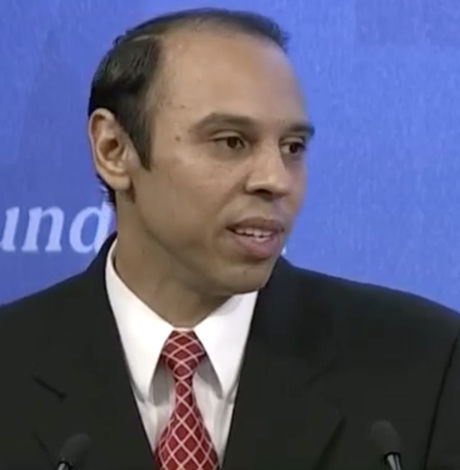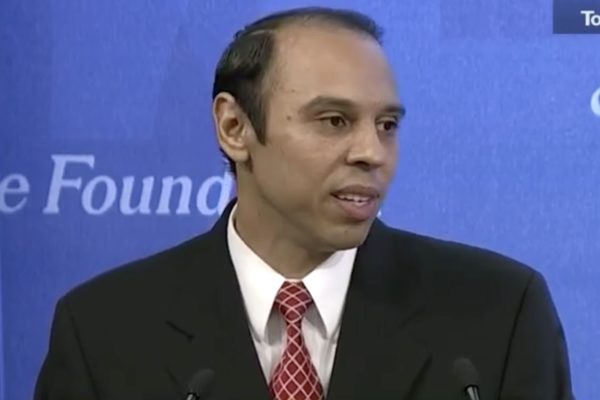National
Trump’s HHS appoints anti-trans activist to protect trans health
Severino a former staffer with the anti-LGBT Heritage Foundation


Roger Severino, director of the DeVos Center for Religion and Civil Society, Institute for Family, Community, and Opportunity at the Heritage Foundation. (Image courtesy C-Span)
A series of statements from LGBT advocates came out Thursday over the appointment of Roger Severino, who until this week was director of the DeVos Center for Religion & Civil Society for the Heritage Foundation.
Winnie Stachelberg, executive vice president for external affairs at the Center for American Progress, gave no quarter in a statement over the Severino’s appointment and its implications for transgender health.
“Frankly, it is sick that President Trump would appoint Roger Severino to lead OCR – putting a man who made his career opposing healthcare non-discrimination laws in charge of enforcing those very same protections,” Stachelberg said. “Before the Affordable Care Act, insurance companies routinely denied equal treatment to same-sex couples and more than half of private insurance plans explicitly discriminated against transgender patients, with more than a quarter of transgender people reported being denied medical care by a provider. Severino’s writing makes it clear that he wants to take us back to the days when 1 in 4 transgender people was refused medical care outright.”
Among the posts Severino wrote for The Daily Signal, the blog for the Heritage Foundation, were in opposition to LGBT people, especially transgender rights. After the White House came out against a provision in a congressional defense spending package that would have allowed anti-LGBT discrimination among federal contractors, Severino wrote a post called “Obama Threatens to Veto Military Bill Because It Protects Religious Groups.” After the Pentagon lifted its ban on openly transgender service, Severino wrote a post called “Pentagon’s Transgender Policy Defies Common Sense.”
Severino also defended North Carolina’s anti-LGBT House Bill 2, which prohibits transgender people from using the restroom in schools and government buildings consistent with their gender identity. Decrying the “unrelenting and coordinated attacks” against the state for enacting the law, Severino criticized former U.S. Attorney General Loretta Lynch for filing a federal lawsuit against the measure, which he said amounted to progressives “using government power to coerce everyone, including children, into pledging allegiance to a radical new gender ideology.”
Marguerite Bowling, a spokesperson for the Heritage Foundation, defended Severino in response to concerns he’d seek to undermine transgender health in his role at HHS.
“Roger Severino has a distinguished record of fighting for the civil rights and freedoms of all Americans,” Severino said. “We have no doubt that Roger in his new role at HHS will protect the civil rights of all Americans.”
As head of the HHS civil rights division, Severino would be charged with enforcing Section 1557 of Obamacare, which prohibits discrimination on the basis of race, sex, disability and age in health programs. The Obama administration interpreted the prohibiting on sex discrimination to bar discrimination against transgender people in health care, including the refusal of gender reassignment surgery.
Wade Henderson, outgoing CEO of the Leadership Conference on Civil & Human Rights, said in a statement the office of civil rights at HHS requires “strong and experienced leadership” to enforce Section 1557, and Severino is “not that leader.”
“Since enactment of the ACA seven years ago today, members of The Leadership Conference have strongly advocated for the full and complete implementation of Section 1557,” Henderson said. “In his previous position at the Heritage Foundation, Mr. Severino repeatedly denounced and actively worked to oppose OCR’s implementation of Section 1557. These actions call into question his ability to fully enforce the ACA and protect communities of color and other underserved populations, who are most at risk for unequal access to health and health care.”
It should be noted U.S. District Judge Reed O’Connor has enjoined the enforcement of the Obamacare regulation interpreting Section 1557 to apply to transgender people. The Trump administration missed a deadline to appeal the decision to the U.S. Fifth Circuit Court of Appeals, but the American Civil Liberties Union is seeking to intervene to defend the regulation.
Harper Jean Tobin, policy director for the National Center for Transgender Equality, said Severino could still do “a number of things” to impact transgender protections under Section 1557 as litigation proceeds.
“The government will now have to make a decision, and OCR is ostensibly the client DOJ in this decision, as to whether to ensure, as the government normally would in a case like this, that federal law and the federal regulation interpreting it and applying the federal law is defended, that a rule overturning it is reviewed by a higher court,” Tobin said. “I think the fear is that OCR and DOJ could sort of work together to have this injunction made permanent without any review by a higher court, which would be highly unusual and really inappropriate.”
After a rule-making process consisting of many years and with two separate comment periods, Tobin said letting the injunction against the regulation stand would be “tantamount to repealing the regulation without going the required rule-making process and instead just acceding to a fringe legal position by one district court judge.”
Tobin added OCR has other responsibilities related to transgender health, such as the federal health care privacy law, or HIPAA, which assures privacy for transgender people in health care settings.
“Up until now, OCR has in cases involving transgender people, just as it does for everybody else, acted to enforce the laws to protect their privacy, but given Mr. Severino’s aggressively hostile work to dismantle any kind of legal protections for transgender people, we’re worried about what kind of direction the agencies would take on those bedrock protections,” Tobin said.
Caitlyn Oakley, an HHS spokesperson, had no comment in response to concerns from LGBT advocacy groups that Severino wouldn’t protect transgender health in his new role.
“We aren’t commenting on personnel at this time,” Oakley said.
Matt McTighe, executive director of Freedom for All Americans, said in a statement Severino appointment to HHS and his anti-trans history spells trouble for transgender health.
“Roger Severino has a proven track record of opposing fair and equal treatment for the transgender community,” McTighe said. “He is a dangerous pick for a position that is meant to enforce critical civil rights protections. This is yet another example of the Trump administration’s failure to live up to the president’s campaign promise of protecting LGBT people and it will have devastating consequences for transgender people across the country.”
The White House
Four states to ignore new Title IX rules protecting transgender students
Biden administration last Friday released final regulations

BY ERIN REED | Last Friday, the Biden administration released its final Title IX rules, which include protections for LGBTQ students by clarifying that Title IX forbids discrimination based on sexual orientation and gender identity.
The rule change could have a significant impact as it would supersede bathroom bans and other discriminatory policies that have become increasingly common in Republican states within the U.S.
As of Thursday morning, however, officials in at least four states — Oklahoma, Louisiana, Florida, and South Carolina — have directed schools to ignore the regulations, potentially setting up a federal showdown that may ultimately end up in a protracted court battle in the lead-up to the 2024 elections.
Louisiana State Superintendent of Education Cade Brumley was the first to respond, decrying the fact that the new Title IX regulations could block teachers and other students from exercising what has been dubbed by some a “right to bully” transgender students by using their old names and pronouns intentionally.
Asserting that Title IX law does not protect trans and queer students, Brumley states that schools “should not alter policies or procedures at this time.” Critically, several courts have ruled that trans and queer students are protected by Title IX, including the 4th U.S. Circuit Court of Appeals in a recent case in West Virginia.
In South Carolina, Schools Supt. Ellen Weaver wrote in a letter that providing protections for trans and LGBTQ students under Title IX “would rescind 50 years of progress and equality of opportunity by putting girls and women at a disadvantage in the educational arena,” apparently leaving trans kids out of her definition of those who deserve progress and equality of opportunity.
She then directed schools to ignore the new directive while waiting for court challenges. While South Carolina does not have a bathroom ban or statewide “Don’t Say Gay or Trans” law, such bills continue to be proposed in the state.
Responding to the South Carolina letter, Chase Glenn of Alliance For Full Acceptance stated, “While Supt. Weaver may not personally support the rights of LGBTQ+ students, she has the responsibility as the top school leader in our state to ensure that all students have equal rights and protections, and a safe place to learn and be themselves. The flagrant disregard shown for the Title IX rule tells me that our superintendent unfortunately does not have the best interests of all students in mind.”
Florida Education Commissioner Manny Diaz also joined in instructing schools not to implement Title IX regulations. In a letter issued to area schools, Diaz stated that the new Title IX regulations were tantamount to “gaslighting the country into believing that biological sex no longer has any meaning.”
Governor Ron DeSantis approved of the letter and stated that Florida “will not comply.” Florida has notably been the site of some of the most viciously anti-queer and anti-trans legislation in recent history, including a “Don’t Say Gay or Trans” law that was used to force a trans female teacher to go by “Mr.”
State Education Supt. Ryan Walters of Oklahoma was the latest to echo similar sentiments. Walters has recently appointed the right-wing media figure Chaya Raichik of Libs of TikTok to an advisory role “to improve school safety,” and notably, Raichik has posed proudly with papers accusing her of instigating bomb threats with her incendiary posts about LGBTQ people in classrooms.
The Title IX policies have been universally applauded by large LGBTQ rights organizations in the U.S. Lambda Legal, a key figure in fighting anti-LGBTQ legislation nationwide, said that the regulations “clearly cover LGBTQ+ students, as well as survivors and pregnant and parenting students across race and gender identity.” The Human Rights Campaign also praised the rule, stating, “rule will be life-changing for so many LGBTQ+ youth and help ensure LGBTQ+ students can receive the same educational experience as their peers: Going to dances, safely using the restroom, and writing stories that tell the truth about their own lives.”
The rule is slated to go into effect Aug. 1, pending any legal challenges.
****************************************************************************

Erin Reed is a transgender woman (she/her pronouns) and researcher who tracks anti-LGBTQ+ legislation around the world and helps people become better advocates for their queer family, friends, colleagues, and community. Reed also is a social media consultant and public speaker.
******************************************************************************************
The preceding article was first published at Erin In The Morning and is republished with permission.
Pennsylvania
Malcolm Kenyatta could become the first LGBTQ statewide elected official in Pa.
State lawmaker a prominent Biden-Harris 2024 reelection campaign surrogate

Following his win in the Democratic primary contest on Wednesday, Pennsylvania state Rep. Malcolm Kenyatta, who is running for auditor general, is positioned to potentially become the first openly LGBTQ elected official serving the commonwealth.
In a statement celebrating his victory, LGBTQ+ Victory Fund President Annise Parker said, “Pennsylvanians trust Malcolm Kenyatta to be their watchdog as auditor general because that’s exactly what he’s been as a legislator.”
“LGBTQ+ Victory Fund is all in for Malcolm, because we know he has the experience to win this race and carry on his fight for students, seniors and workers as Pennsylvania’s auditor general,” she said.
Parker added, “LGBTQ+ Americans are severely underrepresented in public office and the numbers are even worse for Black LGBTQ+ representation. I look forward to doing everything I can to mobilize LGBTQ+ Pennsylvanians and our allies to get out and vote for Malcolm this November so we can make history.”
In April 2023, Kenyatta was appointed by the White House to serve as director of the Presidential Advisory Commission on Advancing Educational Equity, Excellence and Economic Opportunity for Black Americans.
He has been an active surrogate in the Biden-Harris 2024 reelection campaign.
The White House
White House debuts action plan targeting pollutants in drinking water
Same-sex couples face higher risk from environmental hazards

Headlining an Earth Day event in Northern Virginia’s Prince William Forest on Monday, President Joe Biden announced the disbursement of $7 billion in new grants for solar projects and warned of his Republican opponent’s plans to roll back the progress his administration has made toward addressing the harms of climate change.
The administration has led more than 500 programs geared toward communities most impacted by health and safety hazards like pollution and extreme weather events.
In a statement to the Washington Blade on Wednesday, Brenda Mallory, chair of the White House Council on Environmental Quality, said, “President Biden is leading the most ambitious climate, conservation, and environmental justice agenda in history — and that means working toward a future where all people can breathe clean air, drink clean water, and live in a healthy community.”
“This Earth Week, the Biden-Harris Administration announced $7 billion in solar energy projects for over 900,000 households in disadvantaged communities while creating hundreds of thousands of clean energy jobs, which are being made more accessible by the American Climate Corps,” she said. “President Biden is delivering on his promise to help protect all communities from the impacts of climate change — including the LGBTQI+ community — and that we leave no community behind as we build an equitable and inclusive clean energy economy for all.”
Recent milestones in the administration’s climate policies include the U.S. Environmental Protection Agency’s issuance on April 10 of legally enforceable standard for detecting and treating drinking water contaminated with polyfluoroalkyl substances.
“This rule sets health safeguards and will require public water systems to monitor and reduce the levels of PFAS in our nation’s drinking water, and notify the public of any exceedances of those levels,” according to a White House fact sheet. “The rule sets drinking water limits for five individual PFAS, including the most frequently found PFOA and PFOS.”
The move is expected to protect 100 million Americans from exposure to the “forever chemicals,” which have been linked to severe health problems including cancers, liver and heart damage, and developmental impacts in children.
An interactive dashboard from the United States Geological Survey shows the concentrations of polyfluoroalkyl substances in tapwater are highest in urban areas with dense populations, including cities like New York and Los Angeles.
During Biden’s tenure, the federal government has launched more than 500 programs that are geared toward investing in the communities most impacted by climate change, whether the harms may arise from chemical pollutants, extreme weather events, or other causes.
New research by the Williams Institute at the UCLA School of Law found that because LGBTQ Americans are likelier to live in coastal areas and densely populated cities, households with same-sex couples are likelier to experience the adverse effects of climate change.
The report notes that previous research, including a study that used “national Census data on same-sex households by census tract combined with data on hazardous air pollutants (HAPs) from the National Air Toxics Assessment” to model “the relationship between same-sex households and risk of cancer and respiratory illness” found “that higher prevalence of same-sex households is associated with higher risks for these diseases.”
“Climate change action plans at federal, state, and local levels, including disaster preparedness, response, and recovery plans, must be inclusive and address the specific needs and vulnerabilities facing LGBT people,” the Williams Institute wrote.
With respect to polyfluoroalkyl substances, the EPA’s adoption of new standards follows other federal actions undertaken during the Biden-Harris administration to protect firefighters and healthcare workers, test for and clean up pollution, and phase out or reduce use of the chemicals in fire suppressants, food packaging, and federal procurement.
-

 State Department4 days ago
State Department4 days agoState Department releases annual human rights report
-

 South America2 days ago
South America2 days agoArgentina government dismisses transgender public sector employees
-

 District of Columbia2 days ago
District of Columbia2 days agoCatching up with the asexuals and aromantics of D.C.
-

 Politics4 days ago
Politics4 days agoSmithsonian staff concerned about future of LGBTQ programming amid GOP scrutiny












